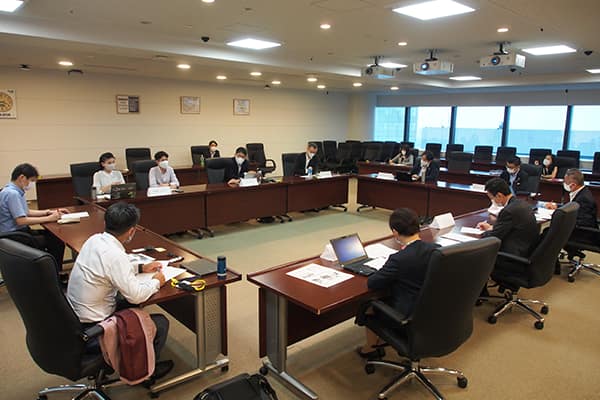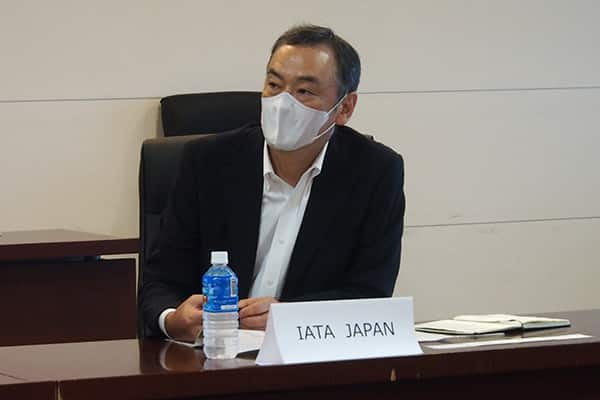Dialogue with Experts on the Environment
Major Activities in FY2020
Dialogue with Experts on the Environment

Here at the ANA Group, we identify social demands through dialogue with stakeholders, and then align our corporate strategy with these requirements, evaluating the impact on business and society. Finally we incorporate these requirements into corporate initiatives.
In this time we held dialogue with a number of experts on "Enviroment" that is Material issue of ANA Group, and saw us discussing global environmental trends.
Theme: Global Environmental Trends
Date and Time: September 23, 2020, 14:00-16:00
Participating Experts:
Yosuke Ikehara (Climale and Energy Group Leader, Conservation Divison, WWF Japan)
Yukihiro Misawa (Plastics Policy Manager, Seafood Markets Manager, Conservation Division, WWF Japan)
Ryoko Nishino (TRAFFIC Programme Officer, Wildlife Group, Conservation Division, WWF Japan)
Yasushi Hibi (Vice President, Conservation International)
Yuji Fujiwara (Country Manager, IATA Japan)
Yasuyoshi Kobayashi (Campaign Manager, IATA Japan)
Facilitator
Hiroshi Ishida (Executive Director, Caux Round Table Japan)
ANA HOLDINGS INC.
Yutaka Ito (Senior Executive Vice President)
Chikako Miyata (Senior Vice President, Director of Corporate Sustainability), and others
Yutaka Ito, Senior Executive Vice President, ANA HOLDINGS INC.

Although the ANA Group finds itself in a difficult financial position, I would like to use the comments from today's dialogue to establishhow exactly we can start executing ESG management in anticipation of changes in social values of the post-COVID-19 world, while also being mindful of the current strong demands for companies to adopt the "new normal" and green recovery.
Chikako Miyata, Senior Vice President, Director of Corporate Sustainability, ANA HOLDINGS INC.
The ANA Group attaches importance to dialogues with stakeholders.
We held a dialogue with experts on Enviroment in June last year and used your valuable comments to set the ANA Group ESG Commitments of Enviroment.
However, the current COVID-19 pandemic has left us with no choice but to review our business operations, and I would therefore like to reconsider the role the ANA Group should be playing. Furthermore, I would also like to use this dialogue as an opportunity to think about what the ANA Group has to offer and how it should contribute to society in consideration of the changes we may see in social values of the post-COVID-19 world.

Yuji Fujiwara, Country Manager, IATA Japan
Embracing New Challenges to Implement CORSIA (Carbon Offsetting and Reduction Scheme for International Aviation)

Travel restrictions have been imposed on people worldwide due to COVID-19, and this has caused revenues across the entire airline industry to fall far further than they did during the aftermath of the bankruptcy of Lehman Brothers in 2008. However, this does not affect the airline industry's commitment to the CORSIA goal of achieving a 50% reduction in net emissions by 2050. Therefore, in the continued pursuit of this goal, each airline is exploring ways to move forward with the decommissioning of energy-inefficient aircraft as well as ways to encourage the usage of sustainable aviation fuels.
Yosuke Ikehara, Climate and Energy Group Leader, Conservation Division, WWF Japan
Efforts Required toward Green Recovery
While global CO2 emissions are expected to fall by 8% due to the impact of the COVID-19 pandemic, the French government, for example, will provide financial support for an airline company on condition that the company would halve its CO2 emissions, replace its old aircrafts with more efficient ones and actively introduce alternative fuel. Thus, the global move toward decarbonization must maintain momentum so that green recovery can be achieved. Companies must therefore take steps without delay toward achieving a zero-carbon society, and this should primarily involve the formulation of climate targets in line with SBTs (Science Based Targets). It is vital to remember that, if we implement measures during the pandemic that ignore the SDGs (Sustainable Development Goals) in favor of focusing solely on economics, we will surely face major risks once the pandemic is over. Thus, I ask companies to keep in mind the sheer importance of considering what conditions will be like during and after the pandemic, and then changing the trajectory of their business strategies accordingly with a view to keeping their business activities sustainable.

Yukihiro Misawa, Plastics Policy Manager, Seafood Markets Manager, Conservation Division, WWF Japan
Countermeasures against Plastic Pollution that Incorporate a Circular Economy Perspective

Plastic waste makes up 80% of all marine debris from land-based sources, with around eight million tons leaking into the ocean every year and crippling marine ecosystems. Japan is the world's third largest producer of plastic waste, but recycles less than 20% of this waste domestically. To tackle this issue, I believe it is imperative that we first reduce the total amount of plastic waste we produce, and then maximize our collection, re-usage and recycling efforts. With the aim of eliminating the release of plastic into the natural environment by 2030 and eventually solving the plastic problem, the WWF will adopt the basic principles of the circular economy system in order to minimize the usage of new resources, and to ensure all plastics are either reused or recycled.
Ryoko Nishino, TRAFFIC Programme Officer, Wildlife Group, Conservation Division, WWF Japan
Wildlife Conservation in a post-COVID environment
Passenger aircraft serve as the transportation methods in 65% of cases of illegal wildlife trade. (This figure covers only those cases which have been seized.) Most notably, a large proportion of this smuggling involves transportation from high-risk markets in Asia (including Thailand, China and Indonesia) to Japan, meaning that animals with high risk of infection diseases such as bats and primates are being brought into the country. With passenger and cargo traffic diversifying, there is a limit can be covered through government screening, and therefore collaborative efforts with the private sector are imperative. The ANA Group is already delivering training on the illegal wildlife trade issues, and I strongly advise that the Group will work together with government agencies going forward in order to further measures and raise awareness of this issue across the entire airline industry.

Yasushi Hibi, Vice President, Conservation International
Global Environmental Trends

Human impact on the Earth has supposedly exceeded "the planetary boundary", particularly in terms of climate change and biodiversity. Earth's climate may be passing a tipping point where we are entering un-chartered territory in terms of the environment. We need to reach net-zero environmental impacts by humanity's social and economic activities with not only CO2 emissions but also other areas such as biodiversity, waste, and land-use, starting now. The ANA Group is challenged to be the leader in the following as we proceed with the "new normal":
- Transform airline business from providing high-speed mode of transportation to customer experience of sustainable lifestyles and green recovery.
- Revise carbon remission reduction targets upward and/or shortening the timeline.
- Reach net-zero negative impact withing its supply chain (e.g., net-zero deforestation, net-zero plastic).
- Invest in natural climate solutions not only to meet carbon targets but to contribute to biodiversity conservation, community support, and/or plastic reduction efforts, especially in the project development/implementation phase.
- Champion wildlife trade countermeasures which also contributes to reducing future zoonosis risks.